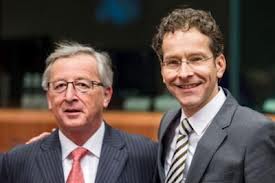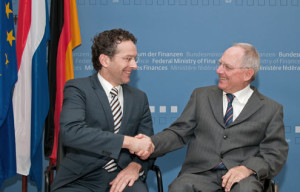
Some claim that Jeroen Dijsselbloem, President of the Euro Group, “unlike others who speak without saying anything is one who says things how they are.” Others suspect that this is true but that he doesn’t understand how things are. Yesterday the new head of the Euro club and the Dutch Finance Minister made the markets crash because they had taken a turn for the better after the agreement to save Cyprus because he candidly replied to a difficult question. “Do you think this is a model?” a journalist from Reuters asked, looking for a comment on the agreement. “What we did last night (Sunday – editor’s note) is what I call throwing out risk,” Dijsselbloem replied. Forgetting to say what made him say, hours and hours later to his spokesperson that “Cyprus is a specific case and there are no fixed models in existence.” In any case the markets crashed because of the idea, validated by the following long interview that from now on will be possible to resolve the crisis from Brussels by closing banks far away and making withdrawals from bank accounts. As long as you are talking about Cyprus with an exposure of some billion, maybe about 20 – maybe it’s even ok, but to transport the same system in Italy for example where the billions in the accounts are hundreds – that’s a different situation.
Dijsselbloem’s problem isn’t that he is young; he is 47 years old, only 4 less than his predecessor Jean-Claude Juncker when he assumed office. His problem is not that he comes from a small country because his native Holland has about 35 times the population of Juncker’s Luxembourg. Not even, looking, the matter is that somebody wanted him. “The job belonged to a Dutchman,” they explain in Brussels, for many reasons; because they needed someone from a “sound” country, because a German was not right, because anyway a person from an “average” country is better. The trouble is there in Holland today the Finance Minister is a graduate of Agricultural Economy (incidentally his name contains the word “flower” in Dutch) not an Economist. And he is one who, before last November had never been a minister, loves to raise pigs in his country home and does not speak French (something that in Brussels is still considered a serious lacuna).

Yesterday was his second (if not third) serious slip up. Not a great record in just a few weeks. The first was to sanction an agreement that calls for all Cypriot bank accounts, even those under the 100,000 Euro threshold protected by an EU directive, should be subject to a forced withdrawal. An uncouth agreement, so “simple” that in fact, it did not hold and was rejected by the Nicosia Parliament without even a vote in favor. Then Dijsselbloem with his perfect English and his rather sought-after look went to the European Parliament to say that “if there is someone responsible for this decision it is me; I should have impeded him,” staying in his place nonetheless. Then he even added that “it is true that this choice undermined faith but the debate between ministers was stronger than the market response.” As if to say, yes, we messed everything up but we have so little influence that the markets didn’t even react. This time they wanted to believe him and the reaction was obvious. You don’t always learn from mistakes. And the nostalgia for Juncker in Europe increases. Not that he has a magic wand, on the contrary, but he certainly was less naïve.
Lorenzo Robustelli










![Il ministro degli Esteri, Antonio Tajani [Bruxelles, 20 marzo 2025. Foto: Emanuele Bonini per Eunews]](https://www.eunews.it/wp-content/uploads/2025/03/Tajani-250320-120x86.jpg)
![La presidente della BCE, Christine Lagarde [archivio]](https://www.eunews.it/wp-content/uploads/2020/11/lag2.png)